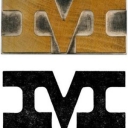Looking for info on the -midioutdev option
@jamcultur The command line flags set the devices to use when Pd is started. They can be used in Pd preferences to fix the devices without opening the midi dialog and saving the setup after starting Pd.
Not so useful in Pd preferences as they will always be the same, they are very useful if starting Pd from a batch file in windows, as you can have different setups for different hardware setups....... e.g. in the studio or out at a venue.
I am not sure how they could be used in Linux... maybe starting Pd from a shell script.
However, the order of devices almost definitely depends on the order in which they were plugged in before starting Pd so it needs some rigour to use -midioutdev. Using -midiaddindev and -midiaddoutdev rather than -midiindev and -midioutdev might solve that... ? I don't know the syntax..... but maybe a list of the devices by name and in the correct order after the flag...?
That could be problematic because of spaces in the device names.... see below.
I see elsewhere that you have a problem having to re-start Pd when plugging in more midi devices.
I wonder whether a request could be made to the Pd-list.
In Pd-extended devices were hot-connected when plugged in, but that is no longer the case in Vanilla. The midi-dialog.tcl file is completely different in the two versions and depends on other .tcl files and probably also on the Pd binary, so midi-dialog.tcl cannot be simply replaced.
There is also a fixed limit of 9 midi devices. I think windows has a limit of 10, and the registry needs to be edited by removing an old entry before adding a new one.
There are ways to set devices from within a patch using [midisettings]........ see set_midi-order.pd.... midisettings.zip
The idea is to reset the order of devices to what is required, by sending a list to Pd (a midi-dialog list).
It will need some work, using [midisettings] (part of the mediasettings external) as the names returned by the [listdevices( message are symbols with spaces inside. Since some version of vanilla the spaces can be escaped so the complete symbol can be used in the route object.... https://forum.pdpatchrepo.info/topic/13506/list-comparison/2
Otherwise, for older vanilla you will need [concat] which is in the thread.
So get the midi device names with their order numbers, and then re-order the numbers by device name according to what you require, and then send the re-ordered numbers back to Pd in a [midi-dialog( message.
When you implement that it will no longer matter in what order you plug the devices or in what order they appear in the midi settings menu when you start Pd.
Here is a quick re-write of set_midi-order.pd escaping spaces with a backslash for midi devices on my system....... set_midi-order.pd
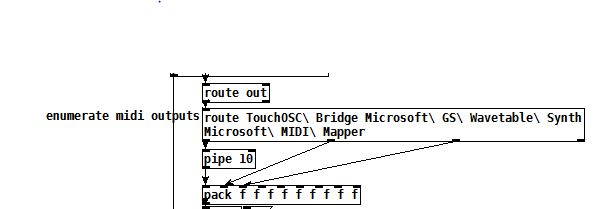
The same can be achieved for audio devices using the [audio-dialog( message and [audiosettings].
David.
On-air light, trouble receiving int via OSC
I'd like to make a suggestion: Pick one set of objects to handle OSC, and just use those. It's in the nature of a tech forum for different people to have different opinions and offer multiple suggestions, but mixing and matching many different approaches can also lead to confusion.
So, for example, your screenshot -- at the top left, you have [packOSCstream] (why this and not [packOSC]? ** ) and then below, [oscformat]. That's a source of confusion. These two objects have quite different ways of handling OSC addresses (or what I've been calling "command paths") -- two idioms. Nah, this is a good way to introduce mistakes. So, pick one that you're more comfortable with.
** Ah, I see, [packOSC} help says "[packOSCstream] is a way to send OSC over TCP or serial connections" -- but you're using UDP, so, not relevant. Again, simplify: [packOSC] or [oscformat], pick one and stick with it.
Also -- you've got elements of this patch where it's already been explained why they are incorrect. If you connect a "send..." message box directly to a [netsend -u -b], it will not send an OSC-formatted message. Since you are sending to devices that expect OSC-formatted messages, for OSC it is always incorrect to pass a "send..." message directly to [netsend]. Never do this. But, in the top left part of your patch, I count 3 "send" message boxes that are patched directly to [netsend]. Delete those patch cables.
(Similarly, at the bottom of your patch, the line of objects coming directly down from [list trim] --> [route ch] --> [route 1 2 3 4] -- this is a part of my example patch that I had labeled with a comment saying "this will not work." Copying and pasting the non-working part is again going to be a source of confusion.)
~~
An OSC message has two parts.
- An address (for command) with slashes, e.g. /cs/chan/at/0.
- A list of arguments.
- The argument list always has datatype tags, even if you don't specify them.
- If you didn't write type tags, it will guess. In Pd, all numbers are floating-point, so outgoing OSC will format numbers as floating-point by default.
- The X32 documentation says that it expects an integer 1 or 0. So, in [oscformat], you can force a number in a specific position to be integer-formatted by giving "i" as the type tag.
So...
Which.. for the message [set /cs/chan/select/47(, might make sense, because there's the 47?
No, it's not the 47. The 47 is part of the command path. How do you know it's part of the command path? Because it's connected with slashes in the device docs. The command path is totally excluded from the type tags -- it's always a string.
It gets a bit confusing with [oscformat] because the vanilla OSC objects write both the OSC address and the arguments as lists (no slashes).
- [packOSC] way: [send /cs/chan/select/47(
- [oscformat] way: [set cs chan select 47, bang(
OK, let's look at those.
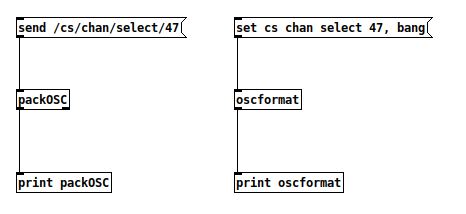
packOSC: 47 99 115 47 99 104 97 110 47 115 101 108 101 99 116 47 52 55 0 0 44 0 0 0
oscformat: 47 99 115 47 99 104 97 110 47 115 101 108 101 99 116 47 52 55 0 0 44 0 0 0
Notice that these are byte-for-byte identical. So these are just two different ways of expressing the same idea. (I do see in your screenshot where you're mixing and matching syntax, trying to use [oscformat] syntax with [packOSC] -- nope, this is not going to work. They have different programming interfaces.)
I suggest to slow down and do some smaller scale tests to make sure you can get the right result from the lighting board. Integration should come later.
hjh
ELSE 1.0-0 RC12 with Live Electronics Tutorial Released
Hi, it's been a while, here we go:
RELEASE NOTES:
Hi, it's been almost 8 months without an update and I never took this long!!! So there's a lot of new stuff to cover, because it's not like I've been just sleeping around 
The reason for the delay is that I'm trying to pair up with the release cycles of PlugData and we're having trouble syncing up. PlugData 0.9.0 came out recently after a delay of 6 months and we couldn't really sync and pair up then... we had no luck in syncing for a new update now, so now I'm just releasing it up cause enough is enough, and hopefully in the next plugdata release we can sync and offer the same version.
As usual, the development pace is always quite busy and I'm just arbitrarily wrapping things up in the middle of adding more and more things that will just have to wait.
First, I had promised support for double precision. I made changes so we can build for it, but it's not really working yet when I uploaded to deken and tested it. So, next time?
And now for the biggest announcement: - I'm finally and officially releasing a new pack as a submodule, which is a set of abstractions inspired by EuroRack Modules, so I'm thinking of VCV like things but into the Pd paradigm. Some similar stuff has been made for Pd over the years, most notably and famously "Automatonism", but I'm really proud of what I'm offering. I'm not trying to pretend Pd is a modular rack and I'm taking advantage of being in Pd. I'm naming this submodule "Modular EuroRacks Dancing Along" (💩 M.E.R.D.A 💩) and I've been working on it for a year and a half now (amongst many other things I do). PlugData has been offering this for a while now, by the way. Not really fully in sync though.
MERDA modules are polyphonic, thanks to multichannel connections introduced in Pd 0.54! There are 20 modules so far and some are quite high level. I'm offering a PLAITS module based on the Mutable Instruments version. I have a 6-Op Phase Modulation module. A "Gendyn" module which is pretty cool. I'm also including an "extra" module that is not really quite a modular thing at all but fits well called "brane", which was a vanilla patch I first wrote like 15 years ago and is a cool granular live sampler and harmonizer. You'll also find the basics, like oscillators, filters, ADSR envelope and stuff I'm still working on. Lastly, a cool thing is that it has a nice presets system that still needs more work but is doing the job so far.
There are ideas and plans to add hundreds more MERDA modules, let's see when and if I can. People can collaborate and help me and create modules that follow the template by the way 
Thanks to Tim Schoen, [play.file~] is now a compiled object instead of an abstraction and it supports MP3, FLAC, WAV, AIF, AAC, OGG & OPUS audio file extensions. A new [sfload] object can import these files into arrays (but still needs lots of more work). There are many other player objects in ELSE that can load and play samples but these don't yet support these new formats (hang in there for the next version update).
Tim also worked on new [pdlink] and [pdlink~] objects, which send control and signal data to/from Pd instances, versions and even forks of Pure Data (it's like [send]/[receive] and [send~]/[receive~], all you need is a symbol, no complicated network or OSC configuration!). And yes, it works via UDP between different computers on the same network. And hell yeah, [pdlink~] has multichannel connections support! By the way, you can also communicate to a [pd~] subprocess. This will be part of ELSE and PlugData of course, and will allow easy communication between PlugData and Pd-Vanilla for instance.
The great pd-lib-build system has been replaced for a 'cmake' build process called 'pd.build' by Pierre Guillot. This was supposed to simplify things. Also, the [sfont~] object was a nightmare to build and with several dependencies that was simply hell to manage, now we have a new and much simpler system and NO DEPENDENCIES AT ALL!!! Some very rare file formats with obscure and seldom sound file extensions may not work though... (and I don't care, most and the 'sane' ones will work). The object now also dumps all preset information with a new message and backwards compatibility broke a bit 
I'm now back to offering a modified version of [pdlua] as part of ELSE, which has recently seen major upgrades by Tim to support graphics and signals! This is currently needed in ELSE to provide a new version of [circle] that needed to be rewritten in lua so it'd look the same in PlugData. Ideally I'd hope I could only offer compiled GUI objects, but... things are not ideal 
The lua loader works by just loading the ELSE library, no need for anything "else". I'm not providing the actual [pdlua] and [pdluax] objects as they are not necessary, and this is basically the only modification. Since PlugData provides support for externals in lua, if you load ELSE you can make use of stuff made for PlugData with lua without the need to install [pdlua] in Pd-Vanilla.
For next, we're working on a [lua] object that will allow inline scripting and will also work for audio signals (again, wait for the next version)! Also for the next version, I'm saving Ben Wesch's nice 3d oscilloscope made in lua (it'll be called [scope3d~]). There's a lot going on with the lua development, which is very exciting.
As for more actual new objects I'm including, we have [vcf2~] and [damp.osc~]. The first is a complex one pole resonant filter that provides a damping oscillation for a ringing time you can set, the next is an oscillator based on it. There's also the new [velvet~] object, a cool and multichannel velvet noise generator that you can also adjust to morph into white noise.
I wasn't able to add multichannel capabilities to many existing objects in ELSE in this one, just a couple of them ([cosine~] and [pimp~]). Total number of objects that are multichannel aware now are: 92! This is almost a third of the number of audio objects in ELSE. I think that a bit over half might be a reasonably desired target. More multichannel support for existing objects to come in the next releases.
Total number of objects in the ELSE library is now 551!
As for the Live Electronics tutorial, as usual, there are new examples for new objects, and I made a good revision of the advanced filter section, where I added many examples to better explain how [slop~] works, with equivalent [fexpr~] implementations.
Total number of examples in the Live Electronics Tutorial is now 528!
There are more details of course, and breaking changes as usual, but these are the highlights! For a full changelog, check https://github.com/porres/pd-else/releases/tag/v.1.0-rc12 (or below at this post).
As mentioned, unfortunately, ELSE RC12 is not yet fully merged, paired up and 100% synced in PlugData. PlugData is now at version 0.9.1, reaching the 1.0 version soon. Since ELSE is currently so tightly synced to the development of PlugData, the idea is to finally offer a final 1.0 version of ELSE when PlugData 1.0 is out. Hence, it's getting closer than ever  Hopefully we will have a 100% synced ELSE/PlugData release when 0.9.2 is out (with a RC 13 maybe?).
Hopefully we will have a 100% synced ELSE/PlugData release when 0.9.2 is out (with a RC 13 maybe?).
Please support me on Patreon https://www.patreon.com/porres
You can follow me on instagram as well if you like... I'm always posting Pd development stuff over there https://www.instagram.com/alexandre.torres.porres/
cheers
ps. Binaries for mac/linux/windows are available via deken. I needed help for raspberry pi
CHANGELOG:
LIBRARY:
Breaking changes:
- [oscope~] renamed to [scope~]
- [plaits~] changed inlet order of modulation inputs and some method/flags name. If a MIDI pitch of 0 or less input is given, it becomes a '0hz'.
- [gbman~] changed signal output range, it is now filtered to remove DC and rescaled to a sane -1 to 1 audio range.
- [dust~] and [dust2~] go now up to the sample rate and become white noise (removed restriction that forced actual impulses, that is, no conscutive non zero values)
- [cmul~] object removed (this was only used in the old conv~ abstraction to try and reduce a bit the terrible CPU load)
- [findfile] object removed (use vanilla's [file which] now that it has been updated in Pd 0.55-0)
- [voices] swapped retrig modes 0 and 1, 'voices' renamed to 'n', now it always changes voice number by default as in [poly] (this was already happening unintentionally as a bug when one voice was already taken). The 'split' mode was removed (just use [route], will you?)
- [voices~] was also affected by changes in [voices] of course, such as 'voices' message being renamed to 'n'.
- [sr~]/[nyquist] changed output loading time to 'init' bang
- [sample~] object was significantly redesigned and lots of stuff changed, new messages and flags, added support for 64-bit audio files (Pd 0.55 in double precision and ELSE compiled for 64 bits is required for this). Info outlet now also outputs values for lenght in ms and bit depth.
- [sfont~] uses now a simpler build system and this might not load very very rare and unusual sound formats.
Enhancements/fixes/other changes:
- builds for double precision is now supposedly supported, by the way, the build system was changed from pd-lib-builder to pd.build by Pierre Guillot.
- [play.file~] is now a compiled object instead of an abstraction thanks to Tim Schoen, and it supports MP3, FLAC, WAV, AIF, AAC, OGG & OPUS file extensions.
- Support for double precision compilation was improved and should be working for all objects (not yet providing binaries and fully tested yet by the way).
- The ELSE binary now loads a modified version of [pdlua], but no [pdlua] and [pdluax] objects are provided.
- added signal to 2nd inlet of [rm~].
- fixed 'glide' message for [mono~].
- fixed [voices] consistency check bug in rightmost outlet and other minor bugs, added flags for 'n', 'steal' and offset.
- [gain~] and [gain2~] changed learn/forget shortcut
- [knob] fixed sending messages to 'empty' when it shouldn't, ignore nan/inf, prevent a tcl/tk error if lower and upper values are the same; added "learn/forget" messages and shortcut for a midi learn mechanism.
- [mpe.in] now outputs port number and you can select which port to listen to.
- Other MIDI in objects now deal with port number encoded to channel as native Pd objects. Objects affected are [midi.learn], [midi.in], [note.in], [ctl.in], [bend.in], [pgm.in], [touch.in] and [ptouch.in].
- [pi]/[e] now takes a value name argument.
- [sr~]/[nyquist~] take clicks now and a value name argument.
- fixed phase modulation issues with [impulse~] and [pimp~].
- [cosine~] fixed sync input.
- added multichannel features to [cosine~] and [pimp~].
- [plaits~] added a new 'transp' message and a functionality to allow MIDI input to supersede signal connections (needed for the 'merda' version [see below]), fixed MIDI velocity.
- [pluck~] added a new functionality to allow MIDI input to supersede signal connections (needed for the 'merda' version [see below]).
- 26 new objects, [velvet~], [vcf2~], [damp.osc~], [sfload], [pdlink] and [pdlink~], plus abstractions from a newly included submodule called "Modular Euro Racks Dancing Along" (M.E.R.D.A)! Warning, this is all just very very experimental still, the object are: [adsr.m~], [brane.m~], [chorus.m~], [delay.m~], [drive.m~], [flanger.m~], [gendyn.m~], [lfo.m~], [phaser.m~], [plaits.m~], [plate.rev.m~], [pluck.m~], [pm6.m~], [presets.m], [rm.m~], [seq8.m~], [sig.m~], [vca.m~], [vcf.m~] and [vco.m~] (6 of these are multichannel aware).
Objects count: total of 551 (307 signal objects [92 of which are MC aware] and 244 control objects)!
- 311 coded objects (203 signal objects / 108 control objects
- 240 abstractions (104 signal objects / 136 control objects)
TUTORIAL:
- New examples and revisions to add the new objects, features and breaking changes in ELSE.
- Added a couple of examples for network communication via FUDI and [pdlink]/[pdlink~]
- Section 36-Filters(Advanced) revised, added more examples and details on how [slop~] works.
- Total number of examples is now 528!
solution for midi-style patchbay (MS20 usb controller)
@cfry This should at least mostly work, not completely clear on how the patch panel of the MS-20 controller works or your exact intentions so I made some assumptions. It assumes sane connections and will fail if you try to connect two outs or two ins because of how the message is constructed and it does not check for duplicates which is a good thing if the controller allows the use of y-cables. It also assumes disconnects happen before a connect, which should be safe since you can not plug something into a jack without first unplugging what is there unless it works with stackable cables and in which case this is a good thing.
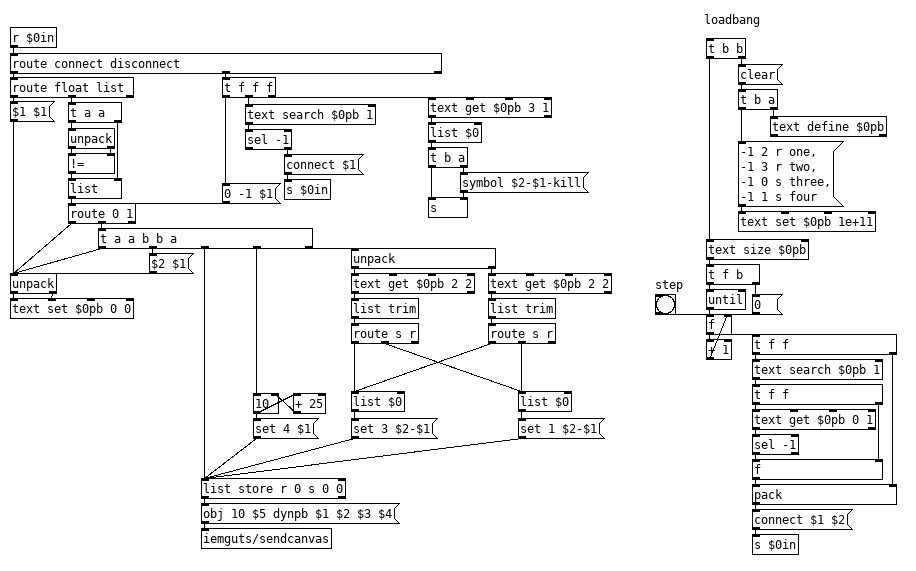
pb.pd
dynpb.pd
I left off the [load bang] so you can step through everything and watch it happen and see what is going on and send it incorrect messages and see what happens, etc. Open [text define $0pb], click {clear( to load the defaults then click step 4 times and watch how the [text] is updated. Now the float atoms at the top are connected and changing the values in the top two changes the values of the bottom two. Start work through the six list boxes top to bottom and see what happens in the text and too the float atoms. You should be able to sort it out fairly quickly with the help of some {print]s and/or list boxes, the logic is fairly direct.
I have the [text] formatted as jack number being line number, its connection status as you did in your [list store] version but -1 instead of 0, followed by default connection (possibly not needed depending on how the MS20 works, does it send the default prepatched connection after a disconnect?), s or r to say if it is an input or an output and then a send or receive symbol without the $0. The $0 being added to the symbols externally means we can stick this all in an abstraction and just send the parents $0 to the right inlet of the three [list $0] and still have everything work as it should. The [iemguts/sendcanvas] should probably be replaced with a send to a subpatch and a subpatch to send too, I did it that way so you can see what happens as it happens.
pd-else + libpd on iOS
Hi, I'm trying to use pd-else with libpd on ios.
I'm makeing pd-else for PLATFORM=x86-64-apple-ios, copying over the output (objectsdir) to my bundle resources, building libpd with ADDITIONAL_LDFLAGS=-ldl, adding with the output to search path PdBase.add(toSearchPath: Bundle.main.resourcePath)
When I'm trying to open a patch which uses pd-else
Some attempts to find files are successful:
2024-04-16 21:14:27.771002+0300 YoganOme[72363:460962] Pd: verbose(4): tried /Users/anvlkv/Library/Developer/CoreSimulator/Devices/19822801-5565-453D-802D-5533CB03027B/data/Containers/Bundle/Application/B61B55C5-FEE9-4A99-964E-D45932D58CE1/YoganOme.app/else/out~.pd and succeeded
2024-04-16 21:14:27.771098+0300 YoganOme[72363:460962] Pd: verbose(4): tried /Users/anvlkv/Library/Developer/CoreSimulator/Devices/19822801-5565-453D-802D-5533CB03027B/data/Containers/Bundle/Application/B61B55C5-FEE9-4A99-964E-D45932D58CE1/YoganOme.app/else/out~.pd and succeeded
But most fails
2024-04-16 21:14:27.751266+0300 YoganOme[72363:460962] Pd: verbose(4): tried /Users/anvlkv/Library/Developer/CoreSimulator/Devices/19822801-5565-453D-802D-5533CB03027B/data/Containers/Bundle/Application/B61B55C5-FEE9-4A99-964E-D45932D58CE1/YoganOme.app/else/out~.darwin-amd64-32.so and failed
2024-04-16 21:14:27.751597+0300 YoganOme[72363:460962] Pd: verbose(4): tried /Users/anvlkv/Library/Developer/CoreSimulator/Devices/19822801-5565-453D-802D-5533CB03027B/data/Containers/Bundle/Application/B61B55C5-FEE9-4A99-964E-D45932D58CE1/YoganOme.app/else/out~.darwin-amd64-0.so and failed
2024-04-16 21:14:27.751739+0300 YoganOme[72363:460962] Pd: verbose(4): tried /Users/anvlkv/Library/Developer/CoreSimulator/Devices/19822801-5565-453D-802D-5533CB03027B/data/Containers/Bundle/Application/B61B55C5-FEE9-4A99-964E-D45932D58CE1/YoganOme.app/else/out~.darwin-fat-32.so and failed
2024-04-16 21:14:27.751876+0300 YoganOme[72363:460962] Pd: verbose(4): tried /Users/anvlkv/Library/Developer/CoreSimulator/Devices/19822801-5565-453D-802D-5533CB03027B/data/Containers/Bundle/Application/B61B55C5-FEE9-4A99-964E-D45932D58CE1/YoganOme.app/else/out~.darwin-fat-0.so and failed
2024-04-16 21:14:27.752090+0300 YoganOme[72363:460962] Pd: verbose(4): tried /Users/anvlkv/Library/Developer/CoreSimulator/Devices/19822801-5565-453D-802D-5533CB03027B/data/Containers/Bundle/Application/B61B55C5-FEE9-4A99-964E-D45932D58CE1/YoganOme.app/else/out~.d_amd64 and failed
2024-04-16 21:14:27.752374+0300 YoganOme[72363:460962] Pd: verbose(4): tried /Users/anvlkv/Library/Developer/CoreSimulator/Devices/19822801-5565-453D-802D-5533CB03027B/data/Containers/Bundle/Application/B61B55C5-FEE9-4A99-964E-D45932D58CE1/YoganOme.app/else/out~.d_fat and failed
2024-04-16 21:14:27.752664+0300 YoganOme[72363:460962] Pd: verbose(4): tried /Users/anvlkv/Library/Developer/CoreSimulator/Devices/19822801-5565-453D-802D-5533CB03027B/data/Containers/Bundle/Application/B61B55C5-FEE9-4A99-964E-D45932D58CE1/YoganOme.app/else/out~.pd_darwin and failed
2024-04-16 21:14:27.752902+0300 YoganOme[72363:460962] Pd: verbose(4): tried /Users/anvlkv/Library/Developer/CoreSimulator/Devices/19822801-5565-453D-802D-5533CB03027B/data/Containers/Bundle/Application/B61B55C5-FEE9-4A99-964E-D45932D58CE1/YoganOme.app/else/out~/out~.darwin-amd64-32.so and failed
2024-04-16 21:14:27.753208+0300 YoganOme[72363:460962] Pd: verbose(4): tried /Users/anvlkv/Library/Developer/CoreSimulator/Devices/19822801-5565-453D-802D-5533CB03027B/data/Containers/Bundle/Application/B61B55C5-FEE9-4A99-964E-D45932D58CE1/YoganOme.app/else/out~/out~.darwin-amd64-0.so and failed
2024-04-16 21:14:27.753470+0300 YoganOme[72363:460962] Pd: verbose(4): tried /Users/anvlkv/Library/Developer/CoreSimulator/Devices/19822801-5565-453D-802D-5533CB03027B/data/Containers/Bundle/Application/B61B55C5-FEE9-4A99-964E-D45932D58CE1/YoganOme.app/else/out~/out~.darwin-fat-32.so and failed
2024-04-16 21:14:27.770480+0300 YoganOme[72363:460962] Pd: verbose(4): tried /Users/anvlkv/Library/Developer/CoreSimulator/Devices/19822801-5565-453D-802D-5533CB03027B/data/Containers/Bundle/Application/B61B55C5-FEE9-4A99-964E-D45932D58CE1/YoganOme.app/else/out~/out~.darwin-fat-0.so and failed
2024-04-16 21:14:27.770636+0300 YoganOme[72363:460962] Pd: verbose(4): tried /Users/anvlkv/Library/Developer/CoreSimulator/Devices/19822801-5565-453D-802D-5533CB03027B/data/Containers/Bundle/Application/B61B55C5-FEE9-4A99-964E-D45932D58CE1/YoganOme.app/else/out~/out~.d_amd64 and failed
2024-04-16 21:14:27.770790+0300 YoganOme[72363:460962] Pd: verbose(4): tried /Users/anvlkv/Library/Developer/CoreSimulator/Devices/19822801-5565-453D-802D-5533CB03027B/data/Containers/Bundle/Application/B61B55C5-FEE9-4A99-964E-D45932D58CE1/YoganOme.app/else/out~/out~.d_fat and failed
2024-04-16 21:14:27.770900+0300 YoganOme[72363:460962] Pd: verbose(4): tried /Users/anvlkv/Library/Developer/CoreSimulator/Devices/19822801-5565-453D-802D-5533CB03027B/data/Containers/Bundle/Application/B61B55C5-FEE9-4A99-964E-D45932D58CE1/YoganOme.app/else/out~/out~.pd_darwin and failed
2024-04-16 21:14:27.771002+0300 YoganOme[72363:460962] Pd: verbose(4): tried /Users/anvlkv/Library/Developer/CoreSimulator/Devices/19822801-5565-453D-802D-5533CB03027B/data/Containers/Bundle/Application/B61B55C5-FEE9-4A99-964E-D45932D58CE1/YoganOme.app/else/out~.pd and succeeded
2024-04-16 21:14:27.771098+0300 YoganOme[72363:460962] Pd: verbose(4): tried /Users/anvlkv/Library/Developer/CoreSimulator/Devices/19822801-5565-453D-802D-5533CB03027B/data/Containers/Bundle/Application/B61B55C5-FEE9-4A99-964E-D45932D58CE1/YoganOme.app/else/out~.pd and succeeded
2024-04-16 21:14:27.771192+0300 YoganOme[72363:460962] Pd: verbose(4): tried /Users/anvlkv/Library/Developer/CoreSimulator/Devices/19822801-5565-453D-802D-5533CB03027B/data/Containers/Bundle/Application/B61B55C5-FEE9-4A99-964E-D45932D58CE1/YoganOme.app/else/else/lb.darwin-amd64-32.so and failed
2024-04-16 21:14:27.771485+0300 YoganOme[72363:460962] Pd: verbose(4): tried /Users/anvlkv/Library/Developer/CoreSimulator/Devices/19822801-5565-453D-802D-5533CB03027B/data/Containers/Bundle/Application/B61B55C5-FEE9-4A99-964E-D45932D58CE1/YoganOme.app/else/else/lb.darwin-amd64-0.so and failed
2024-04-16 21:14:27.771726+0300 YoganOme[72363:460962] Pd: verbose(4): tried /Users/anvlkv/Library/Developer/CoreSimulator/Devices/19822801-5565-453D-802D-5533CB03027B/data/Containers/Bundle/Application/B61B55C5-FEE9-4A99-964E-D45932D58CE1/YoganOme.app/else/else/lb.darwin-fat-32.so and failed
2024-04-16 21:14:27.771987+0300 YoganOme[72363:460962] Pd: verbose(4): tried /Users/anvlkv/Library/Developer/CoreSimulator/Devices/19822801-5565-453D-802D-5533CB03027B/data/Containers/Bundle/Application/B61B55C5-FEE9-4A99-964E-D45932D58CE1/YoganOme.app/else/else/lb.darwin-fat-0.so and failed
2024-04-16 21:14:27.772286+0300 YoganOme[72363:460962] Pd: verbose(4): tried /Users/anvlkv/Library/Developer/CoreSimulator/Devices/19822801-5565-453D-802D-5533CB03027B/data/Containers/Bundle/Application/B61B55C5-FEE9-4A99-964E-D45932D58CE1/YoganOme.app/else/else/lb.d_amd64 and failed
2024-04-16 21:14:27.772645+0300 YoganOme[72363:460962] Pd: verbose(4): tried /Users/anvlkv/Library/Developer/CoreSimulator/Devices/19822801-5565-453D-802D-5533CB03027B/data/Containers/Bundle/Application/B61B55C5-FEE9-4A99-964E-D45932D58CE1/YoganOme.app/else/else/lb.d_fat and failed
2024-04-16 21:14:27.773142+0300 YoganOme[72363:460962] Pd: verbose(4): tried /Users/anvlkv/Library/Developer/CoreSimulator/Devices/19822801-5565-453D-802D-5533CB03027B/data/Containers/Bundle/Application/B61B55C5-FEE9-4A99-964E-D45932D58CE1/YoganOme.app/else/else/lb.pd_darwin and failed
2024-04-16 21:14:27.773783+0300 YoganOme[72363:460962] Pd: verbose(4): tried /Users/anvlkv/Library/Developer/CoreSimulator/Devices/19822801-5565-453D-802D-5533CB03027B/data/Containers/Bundle/Application/B61B55C5-FEE9-4A99-964E-D45932D58CE1/YoganOme.app/else/else/lb/lb.darwin-amd64-32.so and failed
2024-04-16 21:14:27.774359+0300 YoganOme[72363:460962] Pd: verbose(4): tried /Users/anvlkv/Library/Developer/CoreSimulator/Devices/19822801-5565-453D-802D-5533CB03027B/data/Containers/Bundle/Application/B61B55C5-FEE9-4A99-964E-D45932D58CE1/YoganOme.app/else/else/lb/lb.darwin-amd64-0.so and failed
2024-04-16 21:14:27.774935+0300 YoganOme[72363:460962] Pd: verbose(4): tried /Users/anvlkv/Library/Developer/CoreSimulator/Devices/19822801-5565-453D-802D-5533CB03027B/data/Containers/Bundle/Application/B61B55C5-FEE9-4A99-964E-D45932D58CE1/YoganOme.app/else/else/lb/lb.darwin-fat-32.so and failed
2024-04-16 21:14:27.775535+0300 YoganOme[72363:460962] Pd: verbose(4): tried /Users/anvlkv/Library/Developer/CoreSimulator/Devices/19822801-5565-453D-802D-5533CB03027B/data/Containers/Bundle/Application/B61B55C5-FEE9-4A99-964E-D45932D58CE1/YoganOme.app/else/else/lb/lb.darwin-fat-0.so and failed
2024-04-16 21:14:27.776348+0300 YoganOme[72363:460962] Pd: verbose(4): tried /Users/anvlkv/Library/Developer/CoreSimulator/Devices/19822801-5565-453D-802D-5533CB03027B/data/Containers/Bundle/Application/B61B55C5-FEE9-4A99-964E-D45932D58CE1/YoganOme.app/else/else/lb/lb.d_amd64 and failed
2024-04-16 21:14:27.776992+0300 YoganOme[72363:460962] Pd: verbose(4): tried /Users/anvlkv/Library/Developer/CoreSimulator/Devices/19822801-5565-453D-802D-5533CB03027B/data/Containers/Bundle/Application/B61B55C5-FEE9-4A99-964E-D45932D58CE1/YoganOme.app/else/else/lb/lb.d_fat and failed
2024-04-16 21:14:27.777360+0300 YoganOme[72363:460962] Pd: verbose(4): tried /Users/anvlkv/Library/Developer/CoreSimulator/Devices/19822801-5565-453D-802D-5533CB03027B/data/Containers/Bundle/Application/B61B55C5-FEE9-4A99-964E-D45932D58CE1/YoganOme.app/else/else/lb/lb.pd_darwin and failed
2024-04-16 21:14:27.777810+0300 YoganOme[72363:460962] Pd: verbose(4): tried /Users/anvlkv/Library/Developer/CoreSimulator/Devices/19822801-5565-453D-802D-5533CB03027B/data/Containers/Bundle/Application/B61B55C5-FEE9-4A99-964E-D45932D58CE1/YoganOme.app/else/else/lb.pd and failed
2024-04-16 21:14:27.778584+0300 YoganOme[72363:460962] Pd: verbose(4): tried /Users/anvlkv/Library/Developer/CoreSimulator/Devices/19822801-5565-453D-802D-5533CB03027B/data/Containers/Bundle/Application/B61B55C5-FEE9-4A99-964E-D45932D58CE1/YoganOme.app/else/else/lb.pat and failed
2024-04-16 21:14:27.779417+0300 YoganOme[72363:460962] Pd: verbose(4): tried /Users/anvlkv/Library/Developer/CoreSimulator/Devices/19822801-5565-453D-802D-5533CB03027B/data/Containers/Bundle/Application/B61B55C5-FEE9-4A99-964E-D45932D58CE1/YoganOme.app/else/else/lb/else/lb.pd and failed
2024-04-16 21:14:27.780202+0300 YoganOme[72363:460962] Pd: verbose(4): tried /Users/anvlkv/Library/Developer/CoreSimulator/Devices/19822801-5565-453D-802D-5533CB03027B/data/Containers/Bundle/Application/B61B55C5-FEE9-4A99-964E-D45932D58CE1/YoganOme.app/else/else/lb.darwin-amd64-32.so and failed
2024-04-16 21:14:27.781051+0300 YoganOme[72363:460962] Pd: verbose(4): tried /Users/anvlkv/Library/Developer/CoreSimulator/Devices/19822801-5565-453D-802D-5533CB03027B/data/Containers/Bundle/Application/B61B55C5-FEE9-4A99-964E-D45932D58CE1/YoganOme.app/else/else/lb.darwin-amd64-0.so and failed
2024-04-16 21:14:27.781778+0300 YoganOme[72363:460962] Pd: verbose(4): tried /Users/anvlkv/Library/Developer/CoreSimulator/Devices/19822801-5565-453D-802D-5533CB03027B/data/Containers/Bundle/Application/B61B55C5-FEE9-4A99-964E-D45932D58CE1/YoganOme.app/else/else/lb.darwin-fat-32.so and failed
2024-04-16 21:14:27.782005+0300 YoganOme[72363:460962] Pd: verbose(4): tried /Users/anvlkv/Library/Developer/CoreSimulator/Devices/19822801-5565-453D-802D-5533CB03027B/data/Containers/Bundle/Application/B61B55C5-FEE9-4A99-964E-D45932D58CE1/YoganOme.app/else/else/lb.darwin-fat-0.so and failed
2024-04-16 21:14:27.782436+0300 YoganOme[72363:460962] Pd: verbose(4): tried /Users/anvlkv/Library/Developer/CoreSimulator/Devices/19822801-5565-453D-802D-5533CB03027B/data/Containers/Bundle/Application/B61B55C5-FEE9-4A99-964E-D45932D58CE1/YoganOme.app/else/else/lb.d_amd64 and failed
2024-04-16 21:14:27.782651+0300 YoganOme[72363:460962] Pd: verbose(4): tried /Users/anvlkv/Library/Developer/CoreSimulator/Devices/19822801-5565-453D-802D-5533CB03027B/data/Containers/Bundle/Application/B61B55C5-FEE9-4A99-964E-D45932D58CE1/YoganOme.app/else/else/lb.d_fat and failed
2024-04-16 21:14:27.788387+0300 YoganOme[72363:460962] Pd: verbose(4): tried /Users/anvlkv/Library/Developer/CoreSimulator/Devices/19822801-5565-453D-802D-5533CB03027B/data/Containers/Bundle/Application/B61B55C5-FEE9-4A99-964E-D45932D58CE1/YoganOme.app/else/else/lb.pd_darwin and failed
2024-04-16 21:14:27.788947+0300 YoganOme[72363:460962] Pd: verbose(4): tried /Users/anvlkv/Library/Developer/CoreSimulator/Devices/19822801-5565-453D-802D-5533CB03027B/data/Containers/Bundle/Application/B61B55C5-FEE9-4A99-964E-D45932D58CE1/YoganOme.app/else/else/lb/lb.darwin-amd64-32.so and failed
2024-04-16 21:14:27.789356+0300 YoganOme[72363:460962] Pd: verbose(4): tried /Users/anvlkv/Library/Developer/CoreSimulator/Devices/19822801-5565-453D-802D-5533CB03027B/data/Containers/Bundle/Application/B61B55C5-FEE9-4A99-964E-D45932D58CE1/YoganOme.app/else/else/lb/lb.darwin-amd64-0.so and failed
2024-04-16 21:14:27.789586+0300 YoganOme[72363:460962] Pd: verbose(4): tried /Users/anvlkv/Library/Developer/CoreSimulator/Devices/19822801-5565-453D-802D-5533CB03027B/data/Containers/Bundle/Application/B61B55C5-FEE9-4A99-964E-D45932D58CE1/YoganOme.app/else/else/lb/lb.darwin-fat-32.so and failed
2024-04-16 21:14:27.789874+0300 YoganOme[72363:460962] Pd: verbose(4): tried /Users/anvlkv/Library/Developer/CoreSimulator/Devices/19822801-5565-453D-802D-5533CB03027B/data/Containers/Bundle/Application/B61B55C5-FEE9-4A99-964E-D45932D58CE1/YoganOme.app/else/else/lb/lb.darwin-fat-0.so and failed
2024-04-16 21:14:27.790175+0300 YoganOme[72363:460962] Pd: verbose(4): tried /Users/anvlkv/Library/Developer/CoreSimulator/Devices/19822801-5565-453D-802D-5533CB03027B/data/Containers/Bundle/Application/B61B55C5-FEE9-4A99-964E-D45932D58CE1/YoganOme.app/else/else/lb/lb.d_amd64 and failed
2024-04-16 21:14:27.790421+0300 YoganOme[72363:460962] Pd: verbose(4): tried /Users/anvlkv/Library/Developer/CoreSimulator/Devices/19822801-5565-453D-802D-5533CB03027B/data/Containers/Bundle/Application/B61B55C5-FEE9-4A99-964E-D45932D58CE1/YoganOme.app/else/else/lb/lb.d_fat and failed
2024-04-16 21:14:27.790769+0300 YoganOme[72363:460962] Pd: verbose(4): tried /Users/anvlkv/Library/Developer/CoreSimulator/Devices/19822801-5565-453D-802D-5533CB03027B/data/Containers/Bundle/Application/B61B55C5-FEE9-4A99-964E-D45932D58CE1/YoganOme.app/else/else/lb/lb.pd_darwin and failed
2024-04-16 21:14:27.791501+0300 YoganOme[72363:460962] Pd: verbose(4): tried /Users/anvlkv/Library/Developer/CoreSimulator/Devices/19822801-5565-453D-802D-5533CB03027B/data/Containers/Bundle/Application/B61B55C5-FEE9-4A99-964E-D45932D58CE1/YoganOme.app/else/else/lb.pd and failed
2024-04-16 21:14:27.792396+0300 YoganOme[72363:460962] Pd: verbose(4): tried /Users/anvlkv/Library/Developer/CoreSimulator/Devices/19822801-5565-453D-802D-5533CB03027B/data/Containers/Bundle/Application/B61B55C5-FEE9-4A99-964E-D45932D58CE1/YoganOme.app/else/else/lb.pat and failed
2024-04-16 21:14:27.793014+0300 YoganOme[72363:460962] Pd: verbose(4): tried /Users/anvlkv/Library/Developer/CoreSimulator/Devices/19822801-5565-453D-802D-5533CB03027B/data/Containers/Bundle/Application/B61B55C5-FEE9-4A99-964E-D45932D58CE1/YoganOme.app/else/else/lb/else/lb.pd and failed
2024-04-16 21:14:27.793494+0300 YoganOme[72363:460962] Pd: verbose(4): tried /Users/anvlkv/Library/Developer/CoreSimulator/Devices/19822801-5565-453D-802D-5533CB03027B/data/Containers/Bundle/Application/B61B55C5-FEE9-4A99-964E-D45932D58CE1/YoganOme.app/else/else/lb.darwin-amd64-32.so and failed
2024-04-16 21:14:27.795343+0300 YoganOme[72363:460962] Pd: verbose(4): tried /Users/anvlkv/Library/Developer/CoreSimulator/Devices/19822801-5565-453D-802D-5533CB03027B/data/Containers/Bundle/Application/B61B55C5-FEE9-4A99-964E-D45932D58CE1/YoganOme.app/else/else/lb.darwin-amd64-0.so and failed
2024-04-16 21:14:27.795655+0300 YoganOme[72363:460962] Pd: verbose(4): tried /Users/anvlkv/Library/Developer/CoreSimulator/Devices/19822801-5565-453D-802D-5533CB03027B/data/Containers/Bundle/Application/B61B55C5-FEE9-4A99-964E-D45932D58CE1/YoganOme.app/else/else/lb.darwin-fat-32.so and failed
2024-04-16 21:14:27.796345+0300 YoganOme[72363:460962] Pd: verbose(4): tried /Users/anvlkv/Library/Developer/CoreSimulator/Devices/19822801-5565-453D-802D-5533CB03027B/data/Containers/Bundle/Application/B61B55C5-FEE9-4A99-964E-D45932D58CE1/YoganOme.app/else/else/lb.darwin-fat-0.so and failed
2024-04-16 21:14:27.797063+0300 YoganOme[72363:460962] Pd: verbose(4): tried /Users/anvlkv/Library/Developer/CoreSimulator/Devices/19822801-5565-453D-802D-5533CB03027B/data/Containers/Bundle/Application/B61B55C5-FEE9-4A99-964E-D45932D58CE1/YoganOme.app/else/else/lb.d_amd64 and failed
2024-04-16 21:14:27.797921+0300 YoganOme[72363:460962] Pd: verbose(4): tried /Users/anvlkv/Library/Developer/CoreSimulator/Devices/19822801-5565-453D-802D-5533CB03027B/data/Containers/Bundle/Application/B61B55C5-FEE9-4A99-964E-D45932D58CE1/YoganOme.app/else/else/lb.d_fat and failed
2024-04-16 21:14:27.798883+0300 YoganOme[72363:460962] Pd: verbose(4): tried /Users/anvlkv/Library/Developer/CoreSimulator/Devices/19822801-5565-453D-802D-5533CB03027B/data/Containers/Bundle/Application/B61B55C5-FEE9-4A99-964E-D45932D58CE1/YoganOme.app/else/else/lb.pd_darwin and failed
2024-04-16 21:14:27.802219+0300 YoganOme[72363:460962] Pd: verbose(4): tried /Users/anvlkv/Library/Developer/CoreSimulator/Devices/19822801-5565-453D-802D-5533CB03027B/data/Containers/Bundle/Application/B61B55C5-FEE9-4A99-964E-D45932D58CE1/YoganOme.app/else/else/lb/lb.darwin-amd64-32.so and failed
2024-04-16 21:14:27.802831+0300 YoganOme[72363:460962] Pd: verbose(4): tried /Users/anvlkv/Library/Developer/CoreSimulator/Devices/19822801-5565-453D-802D-5533CB03027B/data/Containers/Bundle/Application/B61B55C5-FEE9-4A99-964E-D45932D58CE1/YoganOme.app/else/else/lb/lb.darwin-amd64-0.so and failed
2024-04-16 21:14:27.803686+0300 YoganOme[72363:460962] Pd: verbose(0): else/lb
2024-04-16 21:14:27.804195+0300 YoganOme[72363:460962] Pd: error: ... couldn't create
And indeed there're no such files in the output, there're some with _darwin but not with specific architecture. Also there's no else/else subdirectory
Could anyone give a hint?
No sound. Failed install?
HI,
a newbie, I am trying to install and use Pd 0.53.0 on a Fedora 35 machine.
I think I installed (from source) fine, but I do not get any sound.
I am not sure what I am supposed to check and do.
Some info on my install below.
Thanks for your help.
Below, I doubt line audio APIs: PortAudio ALSA OSS is how it should be, but I am not sure how to fix.
pd 0.53.0 is now configured
Platform: Linux
Debug build: no
Universal build: no
Localizations: yes
Source directory: .
Installation prefix: /usr/local
Compiler: gcc
CPPFLAGS: -DNDEBUG
CFLAGS: -ffast-math -fno-finite-math-only -funroll-loops -fomit-frame-pointer -O3 -g -O2
LDFLAGS:
INCLUDES:
LIBS: -lpthread -ldl
External extension: pd_linux
External CFLAGS: -fPIC
External LDFLAGS: -Wl,--export-dynamic -fPIC
fftw: no
wish(tcl/tk): wish
audio APIs: PortAudio ALSA OSS
midi APIs: ALSA OSS
libpd: no
$ ./pd -listdev
audio input devices:
0. USB Device 0x46d:0x825 (hardware)
1. USB Device 0x46d:0x825 (plug-in)
2. HDA Intel PCH (hardware)
3. HDA Intel PCH (plug-in)
4. HDA NVidia (hardware)
5. HDA NVidia (plug-in)
6. Trust PC Headset (hardware)
7. Trust PC Headset (plug-in)
audio output devices:
0. USB Device 0x46d:0x825 (hardware)
1. USB Device 0x46d:0x825 (plug-in)
2. HDA Intel PCH (hardware)
3. HDA Intel PCH (plug-in)
4. HDA NVidia (hardware)
5. HDA NVidia (plug-in)
6. Trust PC Headset (hardware)
7. Trust PC Headset (plug-in)
API number 1
MIDI input devices:
1. ALSA MIDI device #1
MIDI output devices:
1. ALSA MIDI device #1
priority 94 scheduling failed.```
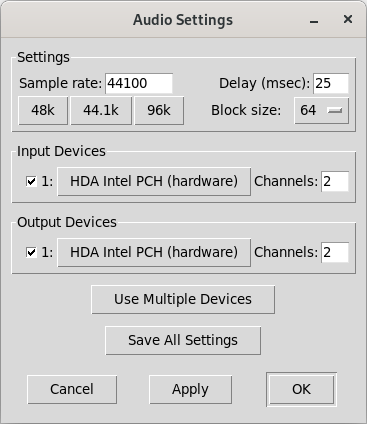
If I try to set to something different from HDA Intel, I get
ALSA input error (snd_pcm_open): Device or resource busy
ALSA output error (snd_pcm_open): No such file or directory
`
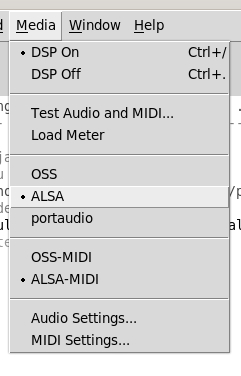
Send .syx file
@oid said:
@ddw_music Long sysex messages work just fine if you treat them as what they are and what pd is quite good at dealing with, streams.
I do understand what you're saying, and I began with the same assumption -- that [midiout] should be just a low-level conduit -- byte goes in, byte gets sent out.
Unfortunately it doesn't work that way in practice.
My test scenario looks like this. Launch SuperCollider and Pure Data. It helps in my case that I'm testing in Linux, where I can create and remove MIDI connections arbitrarily in qjackctl's ALSA tab.
SC code:
MIDIClient.init;
MIDIIn.connect(0, MIDIClient.sources.detectIndex { |src| src.device.containsi("pure") });
m = MIDIOut(0).connect(MIDIClient.destinations.detectIndex { |dst| dst.device.containsi("pure") });
m.connect(MIDIClient.destinations.detectIndex { |dst| dst.device.containsi("superc") });
MIDIdef.sysex(\a, { |... args| args.postln });
Then I need to go to qjackctl and connect Pd's MIDI output to Pd's MIDI input.
At this point, I can send MIDI from either Pd or SuperCollider, and both SC and Pd will respond.
Pd patch, implementing "stream of bytes" (btw I tested both [sysexin] and [midiin], no difference in the results):
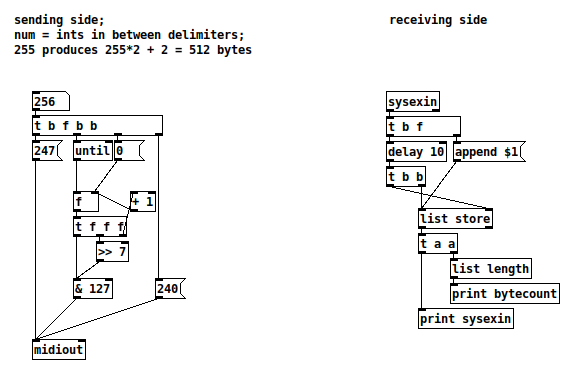
(Note also: Because I am collecting the MIDI-in bytes into a list, I also checked whether there is a maximum list length. There may be, but we won't hit any such limit in these tests -- I could go up to 5000 numbers in a list, no problem. So, in case of any message truncation, it must be happening in the MIDI objects, not in list handling.)
The test case will be to send a packet of n 14-bit integers (MSB first). The total packet size will be n*2 + 2, so if we want to produce exactly b bytes, n = (b / 2) - 1.
SuperCollider sending:
(
f = { |n|
var out = Int8Array[240];
n.do { |i|
out = out.add(i >> 7 & 127).add(i & 127);
};
out.add(247);
};
)
// small packet
m.sysex(f.value(10)); // SC OK, Pd OK (22 bytes)
// 512 bytes
m.sysex(f.value(255)); // both OK
// 514 bytes
m.sysex(f.value(256)); // SC OK, Pd did not print
And my results for Pd sending:
- 22 bytes (n = 10): Both OK
- 512 bytes (n = 255): Both OK
- 514 bytes (n = 256): SC did not respond. Pd printed only 512 bytes (truncated).
Conclusions:
- When SC sent 514 bytes, SC received 514 bytes, so we know SC is sending a complete packet.
- Pd did not respond, suggesting that both [sysexin] and [midiin] simply stopped listening after 512 bytes, did not process the ending delimiter, and thus did not output the packet at all.
- When Pd was asked to send 514 bytes, Pd received only 512 bytes. This suggests that [midiout] is buffering the incoming bytes, waiting for a complete packet before sending, but it must have a limit of 512 bytes, causing the message to be truncated. (And SC didn't respond at all, which suggests that the closing delimiter was never sent.)
So again... in principle, you're correct -- it's technically possible for some [midiout] object to relay the data out, byte by byte. But neither [midiin] nor [midiout] are implemented that way.
hjh
Convert analog reading of a microphone back into sound
Hello, here's an update, this is where I am at:
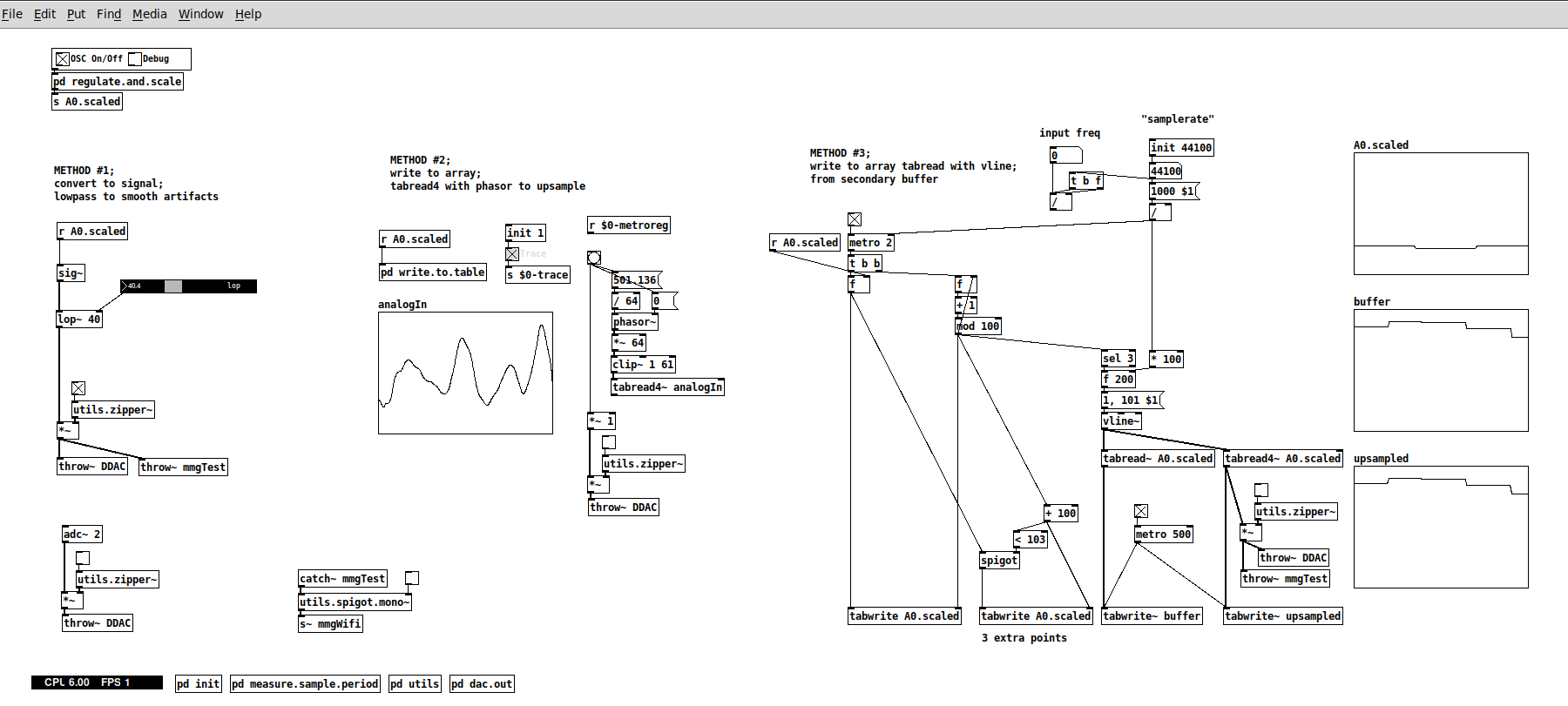
Method #1 with sig~ and lop~ @whale-av
- this works now quite well now. A lop~ at 40 actually hits a sweet spot for the kind of sounds I need to pick up with the mic. Not sure why though. The resulting output is still a bit "noisy", but works well with my patches for the standard XTH Sense, where I use the same mic, but wired. So, this is very good.
Method #2 with tabread4~ @jameslo
- I didn't manage to make it work merely because I didn't understood it fully, not because of the method per se, which looks sound. I didn't put too much work on this, since method #3 seems to be an extension of this, so I focused on the latter.
Method #3 with tabread4~ and vline~ @manuels
- This works well in my patch above, but strangely enough the upsampled signal still presents the steep steps. The output signal sounds as the output from sig~ from method #1. So here I may have missed something in the implementation? or perhaps is the lack of timestamp...
Updates on other solutions we discussed:
- timestamp: I did manage to get a timestamp using the millis() function, which I think should be enough for this use case. This simply counts ms passed from the moment the board has been switched on and attaches it to each reading
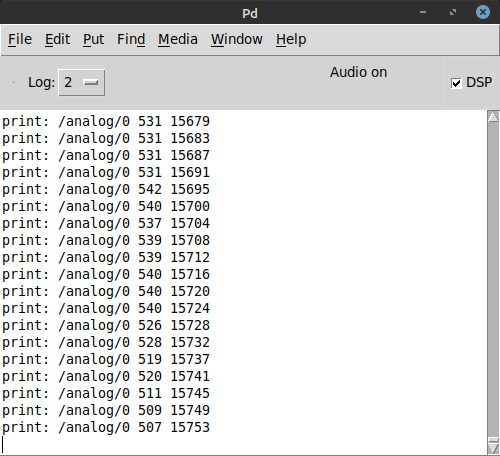
- Increasing the sampling rate on the arduino rp2040 with the microcontroller of the same name seems pretty unexplored (at least after one day of investigation on forums etc..). I need to look more into it. But considering what David pointed out about the brickwall at 689Hz, maybe this is not even an option here.
- FYI, on ARM microcontrollers it is possible to use prescalers, bypass analogRead and read analog data directly from the hardware using register calls at quite fast rates (some people managed to almost 40.000). But I chose the rp2040 for its dimensions, its wifi connectivity (and, partially, for the onboard machine learning features). So if anyone knows of another off-the-shelf board that uses ARM and has similar dimensions and connectivity, please point it to me
 I'll check too of course.
I'll check too of course.
Next steps:
- as it stands, method #1 works well with my patches too and I could just lay back and test this further with my performance software. Especially since by applying the audio signal conditioning and processing I have in my software, the difference with the wired signal is not seriously noticeable and the wireless is even more responsive and less prone to artifacts
- BUT! I would really like to get the upsampling work since it is potentially the most technically sound solution. So I would like now to work more on this using vline~ with the timestamp. A pointer in that direction would be great, since admittedly arrays and tabreads are one of my weak spot in Pd.
P.S. A clarification, before I stated 40Hz as the max. frequency I need to capture, but, to be precise, the range of muscle sounds (including heartbeat and blood flow) is between 1-25/30Hz, as you can see from this pic (a magnitude spectra of the output signal from lop~ capturing a forearm contraction)
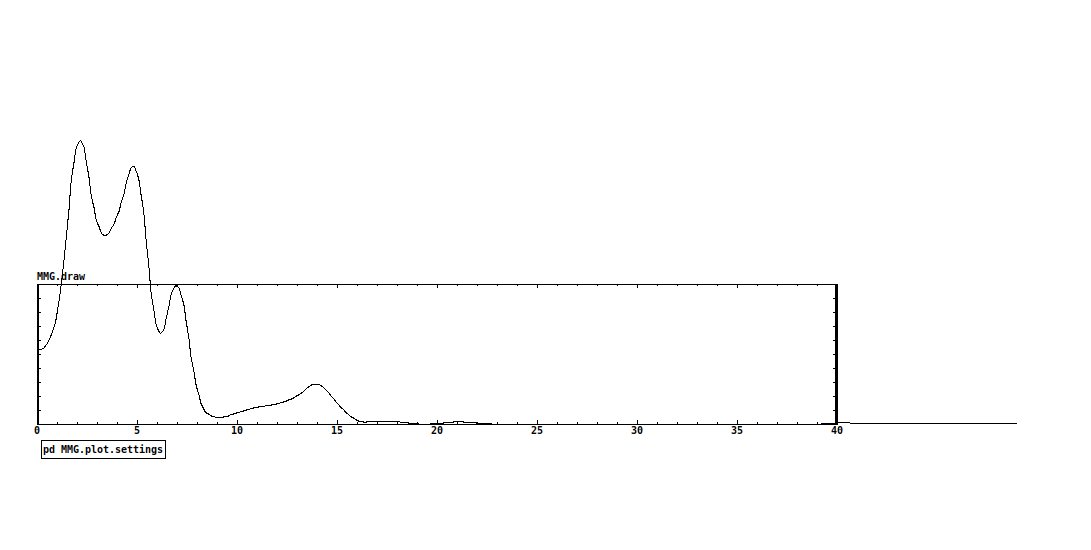
Why does Pd look so much worse on linux/windows than in macOS?
Howdy all,
I just found this and want to respond from my perspective as someone who has spent by now a good amount of time (paid & unpaid) working on the Pure Data source code itself.
I'm just writing for myself and don't speak for Miller or anyone else.
Mac looks good
The antialiasing on macOS is provided by the system and utilized by Tk. It's essentially "free" and you can enable or disable it on the canvas. This is by design as I believe Apple pushed antialiasing at the system level starting with Mac OS X 1.
There are even some platform-specific settings to control the underlying CoreGraphics settings which I think Hans tried but had issues with: https://github.com/pure-data/pure-data/blob/master/tcl/apple_events.tcl#L16. As I recall, I actually disabled the font antialiasing as people complained that the canvas fonts on mac were "too fuzzy" while Linux was "nice and crisp."
In addition, the last few versions of Pd have had support for "Retina" high resolution displays enabled and the macOS compositor does a nice job of handling the point to pixel scaling for you, for free, in the background. Again, Tk simply uses the system for this and you can enable/disable via various app bundle plist settings and/or app defaults keys.
This is why the macOS screenshots look so good: antialiasing is on and it's likely the rendering is at double the resolution of the Linux screenshot.
IMO a fair comparison is: normal screen size in Linux vs normal screen size in Mac.
Nope. See above. 
It could also just be Apple holding back a bit of the driver code from the open source community to make certain linux/BSD never gets quite as nice as OSX on their hardware, they seem to like to play such games, that one key bit of code that is not free and you must license from them if you want it and they only license it out in high volume and at high cost.
Nah. Apple simply invested in antialiasing via its accelerated compositor when OS X was released. I doubt there are patents or licensing on common antialiasing algorithms which go back to the 60s or even earlier.
tkpath exists, why not use it?
Last I checked, tkpath is long dead. Sure, it has a website and screenshots (uhh Mac OS X 10.2 anyone?) but the latest (and only?) Sourceforge download is dated 2005. I do see a mirror repo on Github but it is archived and the last commit was 5 years ago.
And I did check on this, in fact I spent about a day (unpaid) seeing if I could update the tkpath mac implementation to move away from the ATSU (Apple Type Support) APIs which were not available in 64 bit. In the end, I ran out of energy and stopped as it would be too much work, too many details, and likely to not be maintained reliably by probably anyone.
It makes sense to help out a thriving project but much harder to justify propping something up that is barely active beyond "it still works" on a couple of platforms.
Why aren't the fonts all the same yet?!
I also despise how linux/windows has 'bold' for default
I honestly don't really care about this... but I resisted because I know so many people do and are used to it already. We could clearly and easily make the change but then we have to deal with all the pushback. If you went to the Pd list and got an overwhelming consensus and Miller was fine with it, then ok, that would make sense. As it was, "I think it should be this way because it doesn't make sense to me" was not enough of a carrot for me to personally make and support the change.
Maybe my problem is that I feel a responsibility for making what seems like a quick and easy change to others? 
And this view is after having put an in ordinate amount of time just getting (almost) the same font on all platforms, including writing and debugging a custom C Tcl extension just to load arbitrary TTF files on Windows.
Why don't we add abz, 123 to Pd? xyzzy already has it?!
What I've learned is that it's much easier to write new code than it is to maintain it. This is especially true for cross platform projects where you have to figure out platform intricacies and edge cases even when mediated by a common interface like Tk. It's true for any non-native wrapper like QT, WXWidgets, web browsers, etc.
Actually, I am pretty happy that Pd's only core dependencies a Tcl/Tk, PortAudio, and PortMidi as it greatly lowers the amount of vectors for bitrot. That being said, I just spent about 2 hours fixing the help browser for mac after trying Miller's latest 0.52-0test2 build. The end result is 4 lines of code.
For a software community to thrive over the long haul, it needs to attract new users. If new users get turned off by an outdated surface presentation, then it's harder to retain new users.
Yes, this is correct, but first we have to keep the damn thing working at all.  I think most people agree with you, including me when I was teaching with Pd.
I think most people agree with you, including me when I was teaching with Pd.
I've observed, at times, when someone points out a deficiency in Pd, the Pd community's response often downplays, or denies, or gets defensive about the deficiency. (Not always, but often enough for me to mention it.) I'm seeing that trend again here. Pd is all about lines, and the lines don't look good -- and some of the responses are "this is not important" or (oid) "I like the fact that it never changed." That's... thoroughly baffling to me.
I read this as "community" = "active developers." It's true, some people tend to poo poo the same reoccurring ideas but this is largely out of years of hearing discussions and decisions and treatises on the list or the forum or facebook or whatever but nothing more. In the end, code talks, even better, a working technical implementation that is honed with input from people who will most likely end up maintaining it, without probably understanding it completely at first.
This was very hard back on Sourceforge as people had to submit patches(!) to the bug tracker. Thanks to moving development to Github and the improvement of tools and community, I'm happy to see the new engagement over the last 5-10 years. This was one of the pushes for me to help overhaul the build system to make it possible and easy for people to build Pd itself, then they are much more likely to help contribute as opposed to waiting for binary builds and unleashing an unmanageable flood of bug reports and feature requests on the mailing list.
I know it's not going to change anytime soon, because the current options are a/ wait for Tcl/Tk to catch up with modern rendering or b/ burn Pd developer cycles implementing something that Tcl/Tk will(?) eventually implement or c/ rip the guts out of the GUI and rewrite the whole thing using a modern graphics framework like Qt. None of those is good (well, c might be a viable investment in the future -- SuperCollider, around 2010-2011, ripped out the Cocoa GUIs and went to Qt, and the benefits have been massive -- but I know the developer resources aren't there for Pd to dump Tcl/Tk).
A couple of points:
-
Your point (c) already happened... you can use Purr Data (or the new Pd-L2ork etc). The GUI is implemented in Node/Electron/JS (I'm not sure of the details). Is it tracking Pd vanilla releases?... well that's a different issue.
-
As for updating Tk, it's probably not likely to happen as advanced graphics are not their focus. I could be wrong about this.
I agree that updating the GUI itself is the better solution for the long run. I also agree that it's a big undertaking when the current implementation is essentially still working fine after over 20 years, especially since Miller's stated goal was for 50 year project support, ie. pieces composed in the late 90s should work in 2040. This is one reason why we don't just "switch over to QT or Juce so the lines can look like Max." At this point, Pd is aesthetically more Max than Max, at least judging by looking at the original Ircam Max documentation in an archive closet at work. 
A way forward: libpd?
I my view, the best way forward is to build upon Jonathan Wilke's work in Purr Data for abstracting the GUI communication. He essentially replaced the raw Tcl commands with abstracted drawing commands such as "draw rectangle here of this color and thickness" or "open this window and put it here."
For those that don't know, "Pd" is actually two processes, similar to SuperCollider, where the "core" manages the audio, patch dsp/msg graph, and most of the canvas interaction event handling (mouse, key). The GUI is a separate process which communicates with the core over a localhost loopback networking connection. The GUI is basically just opening windows, showing settings, and forwarding interaction events to the core. When you open the audio preferences dialog, the core sends the current settings to the GUI, the GUI then sends everything back to the core after you make your changes and close the dialog. The same for working on a patch canvas: your mouse and key events are forwarded to the core, then drawing commands are sent back like "draw object outline here, draw osc~ text here inside. etc."
So basically, the core has almost all of the GUI's logic while the GUI just does the chrome like scroll bars and windows. This means it could be trivial to port the GUI to other toolkits or frameworks as compared to rewriting an overly interconnected monolithic application (trust me, I know...).
Basically, if we take Jonathan's approach, I feel adding a GUI communication abstraction layer to libpd would allow for making custom GUIs much easier. You basically just have to respond to the drawing and windowing commands and forward the input events.
Ideally, then each fork could use the same Pd core internally and implement their own GUIs or platform specific versions such as a pure Cocoa macOS Pd. There is some other re-organization that would be needed in the C core, but we've already ported a number of improvements from extended and Pd-L2ork, so it is indeed possible.
Also note: the libpd C sources are now part of the pure-data repo as of a couple months ago...
Discouraging Initiative?!
But there's a big difference between "we know it's a problem but can't do much about it" vs "it's not a serious problem." The former may invite new developers to take some initiative. The latter discourages initiative. A healthy open source software community should really be careful about the latter.
IMO Pd is healthier now than it has been as long as I've know it (2006). We have so many updates and improvements over every release the last few years, with many contributions by people in this thread. Thank you! THAT is how we make the project sustainable and work toward finding solutions for deep issues and aesthetic issues and usage issues and all of that.
We've managed to integrate a great many changes from Pd-Extended into vanilla and open up/decentralize the externals and in a collaborative manner. For this I am also grateful when I install an external for a project.
At this point, I encourage more people to pitch in. If you work at a university or institution, consider sponsoring some student work on specific issues which volunteering developers could help supervise, organize a Pd conference or developer meetup (this are super useful!), or consider some sort of paid residency or focused project for artists using Pd. A good amount of my own work on Pd and libpd has been sponsored in many of these ways and has helped encourage me to continue.
This is likely to be more positive toward the community as a whole than banging back and forth on the list or the forum. Besides, I'd rather see cool projects made with Pd than keep talking about working on Pd.
That being said, I know everyone here wants to see the project continue and improve and it will. We are still largely opening up the development and figuring how to support/maintain it. As with any such project, this is an ongoing process.
Out
Ok, that was long and rambly and it's way past my bed time.
Good night all.
Building on Windows - works from Git source, not from tarball
I wanted to build PD on Windows 10 to get ASIO support. I failed when I used the "Source" files from the PD website. I succeeded when I used source that I cloned from Github. I followed the same instructions from the wiki both when I failed and when I succeeded. (They are the same as in the manual, just a little more concise.)
I am sharing below my terminal output from the failed build attempts from the downloaded source code (the tar.gz file). Some of these messages suggest that there might be errors in the makefiles. I don't know anything about makefiles, so I can't really interpret the errors. But I did want to pass them along, in case a developer might find them useful. Here you go:
bhage@LAPTOP-F1TU0LRH MINGW64 /c/Users/bhage/Downloads/pd-0.51-4
$ ./autogen.sh
libtoolize: putting auxiliary files in AC_CONFIG_AUX_DIR, 'm4/config'.
libtoolize: linking file 'm4/config/config.guess'
libtoolize: linking file 'm4/config/config.sub'
libtoolize: linking file 'm4/config/install-sh'
libtoolize: linking file 'm4/config/ltmain.sh'
libtoolize: putting macros in AC_CONFIG_MACRO_DIRS, 'm4/generated'.
libtoolize: linking file 'm4/generated/libtool.m4'
libtoolize: linking file 'm4/generated/ltoptions.m4'
libtoolize: linking file 'm4/generated/ltsugar.m4'
libtoolize: linking file 'm4/generated/ltversion.m4'
libtoolize: linking file 'm4/generated/lt~obsolete.m4'
configure.ac:166: warning: The macro `AC_LIBTOOL_DLOPEN' is obsolete.
configure.ac:166: You should run autoupdate.
aclocal.m4:8488: AC_LIBTOOL_DLOPEN is expanded from...
configure.ac:166: the top level
configure.ac:166: warning: AC_LIBTOOL_DLOPEN: Remove this warning and the call to _LT_SET_OPTION when you
configure.ac:166: put the 'dlopen' option into LT_INIT's first parameter.
../autoconf-2.71/lib/autoconf/general.m4:2434: AC_DIAGNOSE is expanded from...
aclocal.m4:8488: AC_LIBTOOL_DLOPEN is expanded from...
configure.ac:166: the top level
configure.ac:167: warning: The macro `AC_LIBTOOL_WIN32_DLL' is obsolete.
configure.ac:167: You should run autoupdate.
aclocal.m4:8523: AC_LIBTOOL_WIN32_DLL is expanded from...
configure.ac:167: the top level
configure.ac:167: warning: AC_LIBTOOL_WIN32_DLL: Remove this warning and the call to _LT_SET_OPTION when you
configure.ac:167: put the 'win32-dll' option into LT_INIT's first parameter.
../autoconf-2.71/lib/autoconf/general.m4:2434: AC_DIAGNOSE is expanded from...
aclocal.m4:8523: AC_LIBTOOL_WIN32_DLL is expanded from...
configure.ac:167: the top level
configure.ac:168: warning: The macro `AC_PROG_LIBTOOL' is obsolete.
configure.ac:168: You should run autoupdate.
aclocal.m4:121: AC_PROG_LIBTOOL is expanded from...
configure.ac:168: the top level
configure.ac:182: warning: The macro `AC_HEADER_STDC' is obsolete.
configure.ac:182: You should run autoupdate.
../autoconf-2.71/lib/autoconf/headers.m4:704: AC_HEADER_STDC is expanded from...
configure.ac:182: the top level
configure.ac:213: warning: The macro `AC_TYPE_SIGNAL' is obsolete.
configure.ac:213: You should run autoupdate.
../autoconf-2.71/lib/autoconf/types.m4:776: AC_TYPE_SIGNAL is expanded from...
configure.ac:213: the top level
configure.ac:235: warning: The macro `AC_CHECK_LIBM' is obsolete.
configure.ac:235: You should run autoupdate.
aclocal.m4:3879: AC_CHECK_LIBM is expanded from...
configure.ac:235: the top level
configure.ac:276: warning: The macro `AC_TRY_LINK' is obsolete.
configure.ac:276: You should run autoupdate.
../autoconf-2.71/lib/autoconf/general.m4:2920: AC_TRY_LINK is expanded from...
m4/universal.m4:14: PD_CHECK_UNIVERSAL is expanded from...
configure.ac:276: the top level
configure.ac:168: installing 'm4/config/compile'
configure.ac:9: installing 'm4/config/missing'
asio/Makefile.am: installing 'm4/config/depcomp'
bhage@LAPTOP-F1TU0LRH MINGW64 /c/Users/bhage/Downloads/pd-0.51-4
$ autoupdate
configure.ac:182: warning: The preprocessor macro `STDC_HEADERS' is obsolete.
Except in unusual embedded environments, you can safely include all
ISO C90 headers unconditionally.
configure.ac:213: warning: your code may safely assume C89 semantics that RETSIGTYPE is void.
Remove this warning and the `AC_CACHE_CHECK' when you adjust the code.
bhage@LAPTOP-F1TU0LRH MINGW64 /c/Users/bhage/Downloads/pd-0.51-4
$ ^C
bhage@LAPTOP-F1TU0LRH MINGW64 /c/Users/bhage/Downloads/pd-0.51-4
$ ./configure
configure: loading site script /etc/config.site
checking for a BSD-compatible install... /usr/bin/install -c
checking whether build environment is sane... yes
checking for a race-free mkdir -p... /usr/bin/mkdir -p
checking for gawk... gawk
checking whether make sets $(MAKE)... yes
checking whether make supports nested variables... yes
checking build system type... x86_64-w64-mingw32
checking host system type... x86_64-w64-mingw32
configure: iPhone SDK only available for arm-apple-darwin hosts, skipping tests
configure: Android SDK only available for arm-linux hosts, skipping tests
checking for as... as
checking for dlltool... dlltool
checking for objdump... objdump
checking how to print strings... printf
checking whether make supports the include directive... yes (GNU style)
checking for gcc... gcc
checking whether the C compiler works... yes
checking for C compiler default output file name... a.exe
checking for suffix of executables... .exe
checking whether we are cross compiling... no
checking for suffix of object files... o
checking whether the compiler supports GNU C... yes
checking whether gcc accepts -g... yes
checking for gcc option to enable C11 features... none needed
checking whether gcc understands -c and -o together... yes
checking dependency style of gcc... gcc3
checking for a sed that does not truncate output... /usr/bin/sed
checking for grep that handles long lines and -e... /usr/bin/grep
checking for egrep... /usr/bin/grep -E
checking for fgrep... /usr/bin/grep -F
checking for ld used by gcc... C:/msys64/mingw64/x86_64-w64-mingw32/bin/ld.exe
checking if the linker (C:/msys64/mingw64/x86_64-w64-mingw32/bin/ld.exe) is GNU ld... yes
checking for BSD- or MS-compatible name lister (nm)... /mingw64/bin/nm -B
checking the name lister (/mingw64/bin/nm -B) interface... BSD nm
checking whether ln -s works... no, using cp -pR
checking the maximum length of command line arguments... 8192
checking how to convert x86_64-w64-mingw32 file names to x86_64-w64-mingw32 format... func_convert_file_msys_to_w32
checking how to convert x86_64-w64-mingw32 file names to toolchain format... func_convert_file_msys_to_w32
checking for C:/msys64/mingw64/x86_64-w64-mingw32/bin/ld.exe option to reload object files... -r
checking for objdump... (cached) objdump
checking how to recognize dependent libraries... file_magic ^x86 archive import|^x86 DLL
checking for dlltool... (cached) dlltool
checking how to associate runtime and link libraries... func_cygming_dll_for_implib
checking for ar... ar
checking for archiver @FILE support... @
checking for strip... strip
checking for ranlib... ranlib
checking command to parse /mingw64/bin/nm -B output from gcc object... ok
checking for sysroot... no
checking for a working dd... /usr/bin/dd
checking how to truncate binary pipes... /usr/bin/dd bs=4096 count=1
checking for mt... no
checking if : is a manifest tool... no
checking for stdio.h... yes
checking for stdlib.h... yes
checking for string.h... yes
checking for inttypes.h... yes
checking for stdint.h... yes
checking for strings.h... yes
checking for sys/stat.h... yes
checking for sys/types.h... yes
checking for unistd.h... yes
checking for vfork.h... no
checking for dlfcn.h... no
checking for objdir... .libs
checking if gcc supports -fno-rtti -fno-exceptions... no
checking for gcc option to produce PIC... -DDLL_EXPORT -DPIC
checking if gcc PIC flag -DDLL_EXPORT -DPIC works... yes
checking if gcc static flag -static works... yes
checking if gcc supports -c -o file.o... yes
checking if gcc supports -c -o file.o... (cached) yes
checking whether the gcc linker (C:/msys64/mingw64/x86_64-w64-mingw32/bin/ld.exe) supports shared libraries... yes
checking whether -lc should be explicitly linked in... yes
checking dynamic linker characteristics... Win32 ld.exe
checking how to hardcode library paths into programs... immediate
checking whether stripping libraries is possible... yes
checking if libtool supports shared libraries... yes
checking whether to build shared libraries... yes
checking whether to build static libraries... yes
checking for gcc... (cached) gcc
checking whether the compiler supports GNU C... (cached) yes
checking whether gcc accepts -g... (cached) yes
checking for gcc option to enable C11 features... (cached) none needed
checking whether gcc understands -c and -o together... (cached) yes
checking dependency style of gcc... (cached) gcc3
checking for g++... g++
checking whether the compiler supports GNU C++... yes
checking whether g++ accepts -g... yes
checking for g++ option to enable C++11 features... none needed
checking dependency style of g++... gcc3
checking how to run the C++ preprocessor... g++ -E
checking for ld used by g++... C:/msys64/mingw64/x86_64-w64-mingw32/bin/ld.exe
checking if the linker (C:/msys64/mingw64/x86_64-w64-mingw32/bin/ld.exe) is GNU ld... yes
checking whether the g++ linker (C:/msys64/mingw64/x86_64-w64-mingw32/bin/ld.exe) supports shared libraries... yes
checking for g++ option to produce PIC... -DDLL_EXPORT -DPIC
checking if g++ PIC flag -DDLL_EXPORT -DPIC works... yes
checking if g++ static flag -static works... yes
checking if g++ supports -c -o file.o... yes
checking if g++ supports -c -o file.o... (cached) yes
checking whether the g++ linker (C:/msys64/mingw64/x86_64-w64-mingw32/bin/ld.exe) supports shared libraries... yes
checking dynamic linker characteristics... Win32 ld.exe
checking how to hardcode library paths into programs... immediate
checking whether make sets $(MAKE)... (cached) yes
checking whether ln -s works... no, using cp -pR
checking for grep that handles long lines and -e... (cached) /usr/bin/grep
checking for a sed that does not truncate output... (cached) /usr/bin/sed
checking for windres... windres
checking for egrep... (cached) /usr/bin/grep -E
checking for fcntl.h... yes
checking for limits.h... yes
checking for malloc.h... yes
checking for netdb.h... no
checking for netinet/in.h... no
checking for stddef.h... yes
checking for stdlib.h... (cached) yes
checking for string.h... (cached) yes
checking for sys/ioctl.h... no
checking for sys/param.h... yes
checking for sys/socket.h... no
checking for sys/soundcard.h... no
checking for sys/time.h... yes
checking for sys/timeb.h... yes
checking for unistd.h... (cached) yes
checking for int16_t... yes
checking for int32_t... yes
checking for off_t... yes
checking for pid_t... yes
checking for size_t... yes
checking for working alloca.h... no
checking for alloca... yes
checking for error_at_line... no
checking for fork... no
checking for vfork... no
checking for GNU libc compatible malloc... (cached) yes
checking for GNU libc compatible realloc... (cached) yes
checking return type of signal handlers... void
checking for dup2... yes
checking for floor... yes
checking for getcwd... yes
checking for gethostbyname... no
checking for gettimeofday... yes
checking for memmove... yes
checking for memset... yes
checking for pow... yes
checking for regcomp... no
checking for select... no
checking for socket... no
checking for sqrt... yes
checking for strchr... yes
checking for strerror... yes
checking for strrchr... yes
checking for strstr... yes
checking for strtol... yes
checking for dlopen in -ldl... no
checking for cos in -lm... yes
checking for CoreAudio/CoreAudio.h... no
checking for pthread_create in -lpthread... yes
checking for msgfmt... yes
checking for sys/soundcard.h... (cached) no
checking for snd_pcm_info in -lasound... no
configure: Using included PortAudio
configure: Using included PortMidi
checking that generated files are newer than configure... done
configure: creating ./config.status
config.status: creating Makefile
config.status: creating asio/Makefile
config.status: creating doc/Makefile
config.status: creating font/Makefile
config.status: creating mac/Makefile
config.status: creating man/Makefile
config.status: creating msw/Makefile
config.status: creating portaudio/Makefile
config.status: creating portmidi/Makefile
config.status: creating tcl/Makefile
config.status: creating tcl/pd-gui
config.status: creating po/Makefile
config.status: creating src/Makefile
config.status: creating extra/Makefile
config.status: creating extra/bob~/GNUmakefile
config.status: creating extra/bonk~/GNUmakefile
config.status: creating extra/choice/GNUmakefile
config.status: creating extra/fiddle~/GNUmakefile
config.status: creating extra/loop~/GNUmakefile
config.status: creating extra/lrshift~/GNUmakefile
config.status: creating extra/pd~/GNUmakefile
config.status: creating extra/pique/GNUmakefile
config.status: creating extra/sigmund~/GNUmakefile
config.status: creating extra/stdout/GNUmakefile
config.status: creating pd.pc
config.status: executing depfiles commands
config.status: executing libtool commands
configure:
pd 0.51.4 is now configured
Platform: MinGW
Debug build: no
Universal build: no
Localizations: yes
Source directory: .
Installation prefix: /mingw64
Compiler: gcc
CPPFLAGS:
CFLAGS: -g -O2 -ffast-math -funroll-loops -fomit-frame-pointer -O3
LDFLAGS:
INCLUDES:
LIBS: -lpthread
External extension: dll
External CFLAGS: -mms-bitfields
External LDFLAGS: -s -Wl,--enable-auto-import -no-undefined -lpd
fftw: no
wish(tcl/tk): wish85.exe
audio APIs: PortAudio ASIO MMIO
midi APIs: PortMidi
bhage@LAPTOP-F1TU0LRH MINGW64 /c/Users/bhage/Downloads/pd-0.51-4
$ make
CDPATH="${ZSH_VERSION+.}:" && cd . && /bin/sh '/c/Useras/bhage/Downloads/pd-0.51-4/m4/config/missing' aclocal-1.16 -I m4/generated -I m4
configure.ac:170: error: AC_REQUIRE(): cannot be used outside of an AC_DEFUN'd macro
configure.ac:170: the top level
autom4te: error: /usr/bin/m4 failed with exit status: 1
aclocal-1.16: error: autom4te failed with exit status: 1
make: *** [Makefile:451: aclocal.m4] Error 1
bhage@LAPTOP-F1TU0LRH MINGW64 /c/Users/bhage/Downloads/pd-0.51-4
$ make app
CDPATH="${ZSH_VERSION+.}:" && cd . && /bin/sh '/c/Users/bhage/Downloads/pd-0.51-4/m4/config/missing' aclocal-1.16 -I m4/generated -I m4
configure.ac:170: error: AC_REQUIRE(): cannot be used outside of an AC_DEFUN'd macro
configure.ac:170: the top level
autom4te: error: /usr/bin/m4 failed with exit status: 1
aclocal-1.16: error: autom4te failed with exit status: 1
make: *** [Makefile:451: aclocal.m4] Error 1



